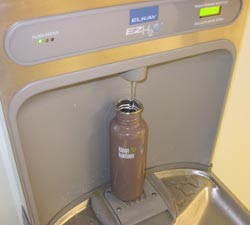New initiatives save money while reducing Temple’s carbon footprint
Two sustainability initiatives launched this semester are designed to help Temple students, faculty and staff save money while shrinking the university’s carbon footprint.
The first is a partnership with Zimride, a ride-sharing tool that uses social networking functionality to bring members of the Temple community together to share commutes. Using a private, web-based network, students, faculty and staff can connect and arrange to travel with others who have similar commuting patterns or plans for one-time rides.
Temple’s private Zimride system can be accessed at zimride.temple.edu. Users must enter a Temple email address or Facebook network account to gain access and then they can view profiles for common networks, interests and friends before sharing details of their own commutes.
After providing information about their travel plans, users are given suggestions for others who have entered similar rides. Commuters are matched based on starting and ending locations, frequency and timing of the rides. The entire system has an optional Facebook integration, allowing users to share their information within their own private group of friends, among members of the Temple Facebook network, or more broadly.
”We are excited to offer a program that will allow our community to easily share rides both around the Philly metro area, and out of town for longer trips,” said Sandra McDade, director of Temple’s Office of Sustainability. “Zimride is a win-win. It’s easy to use, saves users money and helps reduce the university’s green house gas emissions."
In addition to the benefits for Temple and individual commuters, the new ride-sharing tool can help reduce regional traffic congestion and parking problems, said McDade.
A second new initiative aims to reduce waste by encouraging members of the Temple community to reuse their water containers.
Water bottle refilling stations have been installed in the lobbies of several academic buildings on Main Campus, at the Health Science campus and in a number of residence halls. Resembling traditional water fountains, the stations offer no-touch refills for reusable water bottles.
“Students, staff and faculty now have access to free, cool, filtered water on campus, and the university is able to reduce its environmental impact by limiting the amount of waste created by single use water bottles,” said McDade. “We’re very pleased with how quickly they’ve become part of Temple’s culture.”
Students would seem to agree.
“They’re perfect for water bottles — with the built-in filter, it tastes just as good as bottled water and saves money and of course space in landfills,” said junior communication sciences and disorders major Megan Kernan.
Each station has a counter that tracks the number of water bottles diverted from the waste stream. The station at the Paley Library has saved over 32,000 12-ounce bottles since its installation in the fall.
Using fewer plastic bottles impacts not only the immediate environment at Temple; it also has global implications. According to Earth Policy Institute, approximately 17 million barrels of oil are needed to produce the 66 billion single use water bottles sold each year in the United States.
Both new initiatives are part of Temple’s Climate Action Plan, which aims to reduce the university’s carbon footprint by 30 percent by 2030. Visit the Office of Sustainability web site for more information.
— Elizabeth DiPardo
